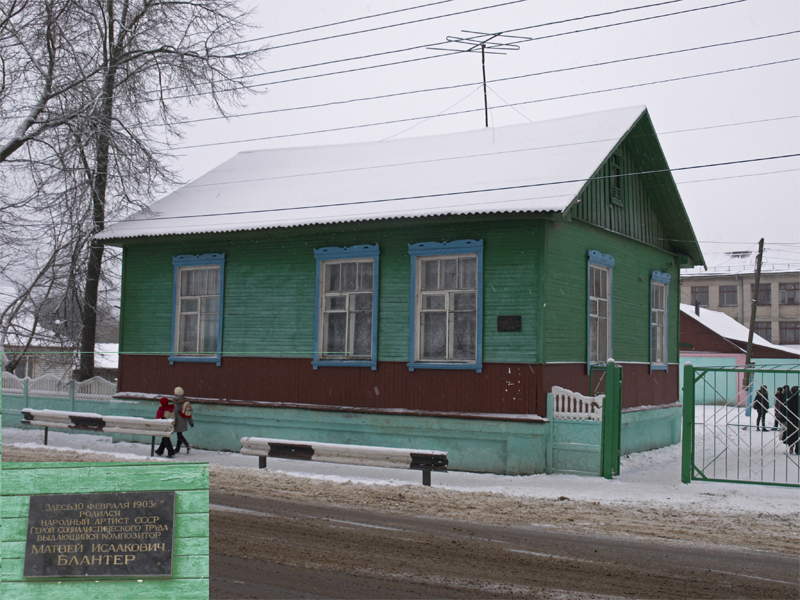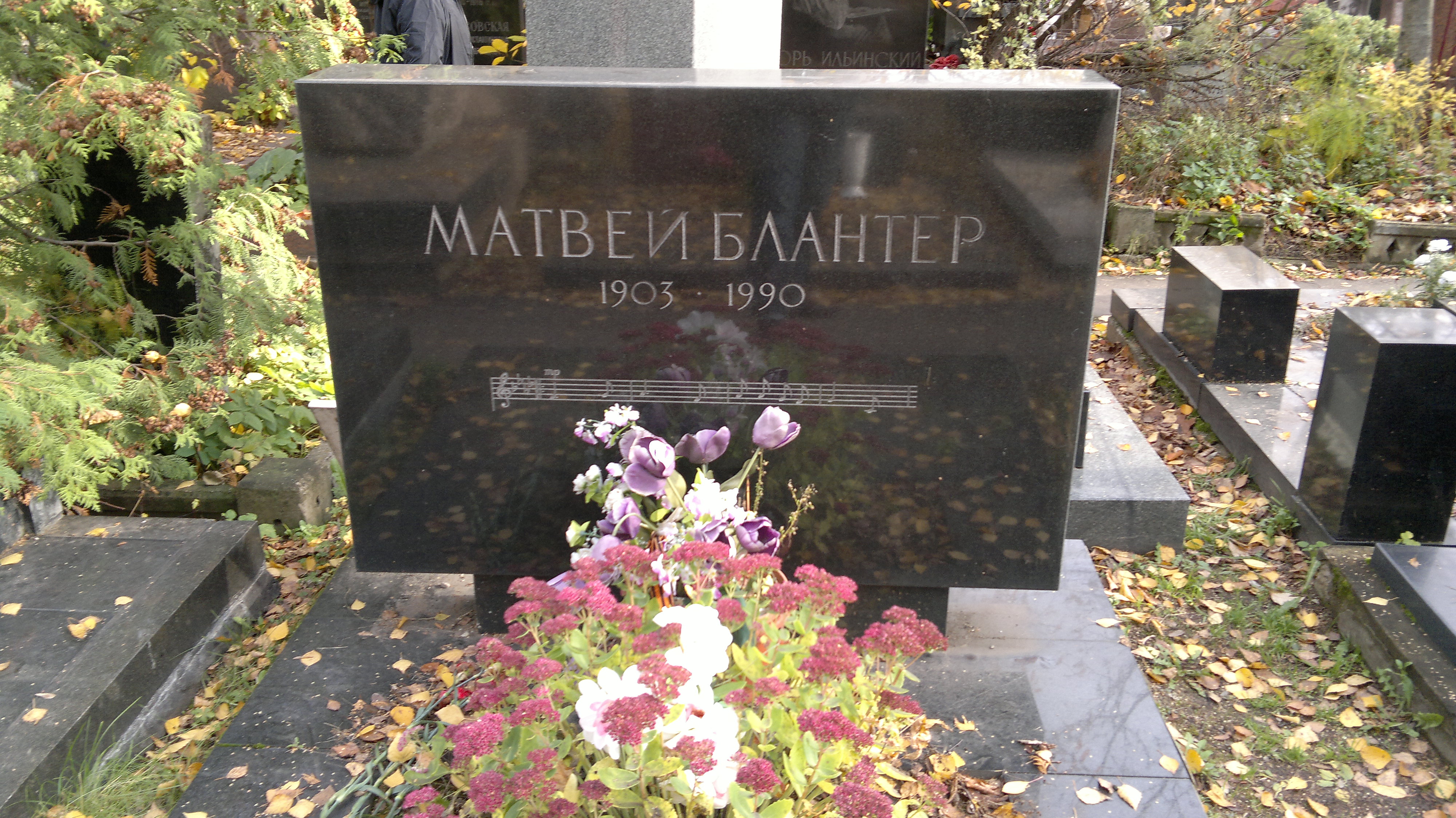Matvey Blanter on:
[Wikipedia]
[Google]
[Amazon]
Matvey Isaakovich Blanter (russian: Матве́й Исаа́кович Бла́нтер) (27 September 1990) was a Soviet composer, and one of the most prominent composers of popular songs and film music in the Soviet Union. Among many other works, he wrote the famous " Katyusha" (1938), performed to this day internationally. He was active as a composer until 1975, producing more than two thousand songs.
 Blanter, the son of a Jewish craftsman, was born in the town of
Blanter, the son of a Jewish craftsman, was born in the town of
 In 1983, Blanter became a member of the Anti-Zionist Committee of the Soviet Public, an organization created by the Soviet Union as an anti-Zionist propaganda tool. He died in Moscow in 1990.
In 1983, Blanter became a member of the Anti-Zionist Committee of the Soviet Public, an organization created by the Soviet Union as an anti-Zionist propaganda tool. He died in Moscow in 1990.
Childhood and education
 Blanter, the son of a Jewish craftsman, was born in the town of
Blanter, the son of a Jewish craftsman, was born in the town of Pochep Pochep (russian: Почеп) is the name of several inhabited localities in Russia.
;Urban localities
*Pochep, Bryansk Oblast, a town in Pochepsky District of Bryansk Oblast;
;Rural localities
* Pochep, Okulovsky District, Novgorod Oblast, a vil ...
, then in the Chernigov Governorate of the Russian Empire. He studied piano and violin at the Kursk
Kursk ( rus, Курск, p=ˈkursk) is a city and the administrative center of Kursk Oblast, Russia, located at the confluence of the Kur, Tuskar, and Seym rivers. The area around Kursk was the site of a turning point in the Soviet–German stru ...
Higher Music School. From 1917 to 1919, he continued his education in Moscow, studying violin and composition.
Career
Blanter's first songs were composed in the 1920s. At the time, he wrote light dance and jazz music, including "John Gray" (1923), a foxtrot that became a major hit. In the 1930s, as Soviet culture grew more ideologically strict, Blanter shifted toward writing Soviet propaganda songs. He emerged as one of the creators of the Soviet "mass song
Mass song (russian: массовая песня ''Massovaya pesnya'') was a genre of Soviet music that was widespread in the Soviet Union. A mass song was written by a professional or amateur composer for individual or chorus singing and intended ...
".
Some of Blanter's 1930s songs were styled after the Red Army songs of the Russian Civil War (1918–1921) and mythologized the war's Bolshevik heroes. The most famous among these are "The Song of Shchors" (1935), telling the tale of Ukrainian Red Army commander Nikolai Shchors, and "Partisan Zheleznyak" (1936), which combines the energetic rhythms of a military marching song with elements of a mournful ballad as it describes Commander Zheleznyak's heroic death in battle (the song opens and closes with a stanza about Zheleznyak's lonely burial mound in the steppes).
Other notable Blanter songs from that period include "Youth" (1937), a cheerful marching song asserting that "right now, everyone is young in our young, beautiful country"; "Stalin Is Our Battle-Glory" (1937), a widely performed hymn to Joseph Stalin; and "The Football March" (1938), music from which is still performed at the start of every football match in Russia.
In 1938, Blanter began his long-lasting collaboration with the poet Mikhail Isakovsky
Mikhail Vasilyevich Isakovsky (russian: Михаи́л Васи́льевич Исако́вский; – 20 July 1973) was a Soviet and Russian poet, lyricist and translator. Hero of Socialist Labour (1970).
Biography
Mikhail Isakovsky was ...
. Their first song, undoubtedly the most famous of Blanter's works, was the world-renowned " Katyusha". In it, Blanter combined elements of the heroic, upbeat battle song and of a peasant song representing a woman's lamentation for an absent lover. Standing on a high riverbank, a young woman, Katyusha, sings of her beloved (compared to "a gray eagle of the steppes"), who is far away serving on the Soviet border. The theme of the song is that the soldier will protect the Motherland and its people while his girl will preserve their love. While the song is joyful and filled with the imagery of a fertile, blooming land, it also conveys the sense that the motherland is under threat. "Katyusha" gained fame during World War II as an inspiration to defend one's land from the enemy.
In 1937, Pravda published a request for thousands of Soviet girls to go to work in the far east of the county, to help construct military defences. Blanter was commissioned to write the highly-popular operetta ''On the Bank of the Amur River'' to celebrate the initiative: the premiere took place at Moscow Operetta Theatre
Moscow ( , US chiefly ; rus, links=no, Москва, r=Moskva, p=mɐskˈva, a=Москва.ogg) is the capital and largest city of Russia. The city stands on the Moskva River in Central Russia, with a population estimated at 13.0 million re ...
in 1939, and the work was broadcast by Moscow Radio
Voice of Russia ( rus, Голос России, r=Golos Rossii), commonly abbreviated VOR, was the Russian government's international radio broadcasting service from 1993 until 2014, when it was reorganised as Radio Sputnik. Its interval signal w ...
as well as taken up by operatic companies throughout the country.
Blanter accompanied the Red Army to Berlin in early 1945. He was commissioned by Stalin to compose a symphony about the capture of Berlin. However, when Vasily Chuikov was meeting with a German delegation led by Hans Krebs to negotiate their surrender following Hitler's suicide, Chuikov had several uniformed war correspondents pretend to be members of his general staff in order to appear more professional and intimidating at the negotiations. But Blanter was also meeting with Chuikov at the time the delegation arrived and he could not pass as a Red Army officer as he was wearing civilian clothes. Thus, Chuikov shoved him into a closet just before the delegate entered the room. While he remained there for most of the conference, he eventually lapsed into unconsciousness from a lack of air, collapsing out of the closet and into the room just as the delegates were preparing to leave, embarrassing Chuikov and astonishing the Germans.
Blanter wrote several other highly popular wartime songs. His 1945 song, "The Enemy Burned Down His Home", about a soldier who returns from the front to find his entire family dead, became controversial when the authorities deemed it too pessimistic and banned its performance; it was performed for the first time in 1961.
Blanter's postwar songs include "The Migratory Birds Are Flying" (1949), a patriotic Soviet song in which the narrator watches migratory birds fly away and asserts that he can think of no better place to be than the Motherland, and "Dark-Eyed Cossack Girl" ( Russian: Черноглазая казачка), written especially for the bass-baritone
A bass-baritone is a high-lying bass or low-lying "classical" baritone voice type which shares certain qualities with the true baritone voice. The term arose in the late 19th century to describe the particular type of voice required to sing thr ...
Leonid Kharitonov.
 In 1983, Blanter became a member of the Anti-Zionist Committee of the Soviet Public, an organization created by the Soviet Union as an anti-Zionist propaganda tool. He died in Moscow in 1990.
In 1983, Blanter became a member of the Anti-Zionist Committee of the Soviet Public, an organization created by the Soviet Union as an anti-Zionist propaganda tool. He died in Moscow in 1990.
Awards and honors
* Stalin Prize (1946) (for the songs "Under the Balkan Stars", "In a way, a path far", "My beloved", "In the forest, front-line") * People's Artist of the RSFSR (1965) * Order of the Badge of Honour (1967) *People's Artist of the USSR
People's Artist of the USSR ( rus, Народный артист СССР, Narodny artist SSSR), also sometimes translated as National Artist of the USSR, was an honorary title granted to artists of the Soviet Union.
Nomenclature and significan ...
(1975)
* Hero of Socialist Labour
The Hero of Socialist Labour (russian: links=no, Герой Социалистического Труда, Geroy Sotsialisticheskogo Truda) was an honorific title in the Soviet Union and other Warsaw Pact countries from 1938 to 1991. It repre ...
(1983)
References in popular culture
Ayn Rand
Alice O'Connor (born Alisa Zinovyevna Rosenbaum;, . Most sources transliterate her given name as either ''Alisa'' or ''Alissa''. , 1905 – March 6, 1982), better known by her pen name Ayn Rand (), was a Russian-born American writer and p ...
's 1936 novel '' We the Living'', set in Petrograd
Saint Petersburg ( rus, links=no, Санкт-Петербург, a=Ru-Sankt Peterburg Leningrad Petrograd Piter.ogg, r=Sankt-Peterburg, p=ˈsankt pʲɪtʲɪrˈburk), formerly known as Petrograd (1914–1924) and later Leningrad (1924–1991), i ...
between 1923 and 1925, has a passage devoted to the huge popularity of "John Gray."
In the 1966 novel ''The Last Battle'',Ryan, Cornelius. ''The Last Battle.'' London: Collins, 1966. Cornelius Ryan records that Blanter accompanied the Red Army into Berlin during the last days of the war and the collapse of Nazi power.
In the 2004 film, '' Downfall'', Blanter plays a small role and is portrayed by Boris Schwarzmann. In the film, he is stuffed into the closet of Vasily Chuikov's office, who is in a rush to meet the Nazi general, Hans Krebs.
References
{{DEFAULTSORT:Blanter, Matvey 1903 births 1990 deaths Anti-Zionist Jews People from Pochepsky District People from Mglinsky Uyezd Russian Jews Soviet Jews Jewish composers Jewish songwriters Jewish socialists Heroes of Socialist Labour People's Artists of the USSR People's Artists of the RSFSR Stalin Prize winners Recipients of the Order of Lenin Burials at Novodevichy Cemetery